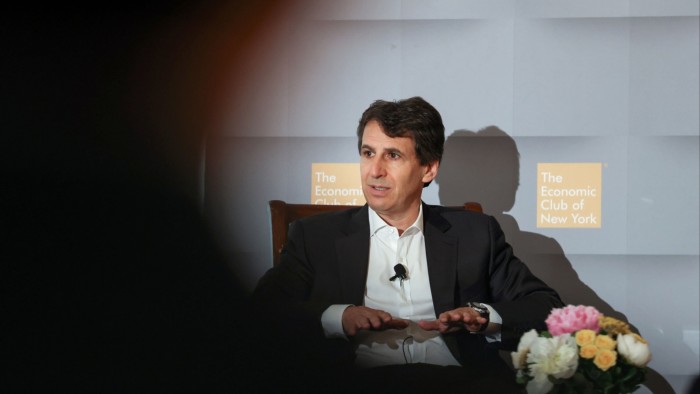One big job move to start: Michael Barr is stepping down as Wall Street’s top regulator but will stay on as a governor at the Federal Reserve. He’ll vacate his role as vice-chair for supervision at the end of February, cutting short a four-year term that began in July 2022.
Welcome to Due Diligence, your briefing on dealmaking, private equity and corporate finance. This article is an on-site version of the newsletter. Premium subscribers can sign up here to get the newsletter delivered every Tuesday to Friday. Standard subscribers can upgrade to Premium here, or explore all FT newsletters. Get in touch with us anytime: [email protected]
In today’s newsletter:
-
Private equity to lobby for 401k access
-
Nippon hurls lawsuits over steel deal
-
Boutique banks’ all-important year
Private equity firms eye 401ks
Private equity giants such as Blackstone and Apollo are always thinking up untapped swaths of cash that could potentially be invested in their funds.
Their latest target: retirement savings.
With a new administration soon to arrive in the White House, these groups are revving up their lobbying efforts to push for deregulation.
The $13tn industry is hoping Donald Trump’s administration will bring back a deregulatory push from the final days of his first presidency that allowed them to be included in professionally managed funds.
That was all well and good. But private equity firms now want to open up even more doors for their funds.
The groups want tax-deferred contribution plans such as 401ks to be able to invest in a whole range of unlisted investments: leveraged buyouts, low-rated private loans and illiquid property deals, DD’s Antoine Gara reports.
Executives told the FT that deregulating would allow their funds to access at least as much in assets as the sovereign wealth funds, pensions and endowments that have traditionally backed the world’s largest groups.
Private equity investments often carry higher leverage, less liquidity and fewer disclosures than traditional mutual funds — plus, they often have higher fees. Until now they’ve been generally limited to institutional investors and wealthy individuals.
Yet some executives worry retirement savers won’t be able to discern between credible funds and fly-by-night entrants chasing lucrative fees. They say private investments should be directed by fiduciaries, rather than individuals selecting funds directly themselves.
Other executives haven’t been shy about their ambitions of accessing retirement plans.
Apollo chief executive Marc Rowan has called the trillions of dollars in assets stored in 401ks a big opportunity. He’s also raised concerns about the plans’ current concentration in index funds.
“I jokingly say sometimes, we levered the entire retirement of America to Nvidia’s performance,” he said at a firm event this autumn. “It just doesn’t seem smart. We’re going to fix this and we are in the process of fixing it.”
Nippon scrambles to save $15bn steel deal
Most corporate executives and advisers returned yesterday after a lengthy stretch of vacation. But those working for Nippon Steel and US Steel had their holidays cut short.
The Japanese company’s $15bn deal to buy the storied American company was dealt its biggest blow yet last week when President Joe Biden issued an order to block the transaction.
Yet as the two companies have shown time and again over the past year, they’re not willing to walk away. On Monday, they launched a legal fight in a final Hail Mary to close the acquisition, ratcheting up the battle one more notch.
They targeted the Biden administration along with a group of outsiders they accuse of “illegal and co-ordinated actions aimed at preventing the transaction”.
The second group consists of US Steel rival Cleveland-Cliffs, its chief executive Lourenco Goncalves and United Steelworkers president David McCall.
Nippon and US Steel are working against the clock. In Biden’s order last Friday, he stipulated that the companies had to abandon the deal within 30 days.
But they’re hoping to get an extension from the Committee on Foreign Investment in the US to break past that date, a person familiar with the litigation told DD. Doing so is their last real hope.
The latest impasse comes at a precarious time politically, with Trump’s inauguration scheduled for later this month — smack in that 30-day window.
Yet it’s not clear if a new administration will change anything, as the Republican has also previously pledged to block the deal.
And on Monday, his post on Truth Social indicated he was still against it: “Why would they want to sell US Steel now when Tariffs will make it a much more profitable and valuable company?”
Bankers’ make-or-break year
The money is in the bank for dealmakers. Now comes the hard part.
Over the past two years, most Wall Street advisory firms have been eager to add expensive talent, even as deal volumes remained anaemic. In some instances, a star hire could command a guarantee of $18mn for two years.
But as the FT’s Josh Franklin and DD’s Sujeet Indap report, an anticipated rally in transactions in 2025 means it’s now time for these free agent signings to deliver.
“The compensation numbers are staggering in some instances,” said Julian Bell, global head of the banking and markets group at headhunter Sheffield Haworth.
Most of the listed boutique banks last year posted remuneration ratios approaching or exceeding 70 per cent — 15 percentage points above what they promise analysts.
But all were willing to sacrifice near-term profits for the chance to grab the heavy hitters who would bring in the blockbuster mandates.
“Historically, periods of disruption and dislocation create opportunities. We capitalised on that opportunity,” said Brian Friedman of Jefferies.
However, it sometimes takes new additions several years to get acclimated to a new firm and make progress with clients.
Several big hires are coming off of guarantees and 2025 will be the year they must deliver if they want to maintain their standard of living. And one CEO warned not everyone is going to survive an eventual culling of the herd.
Job moves
-
Meta appointed Ultimate Fighting Championship chief executive and Donald Trump supporter Dana White to its board of directors. The company also named former Microsoft executive Charlie Songhurst and Exor chief executive John Elkann to the board.
-
Richard Powell joined communications group Prosek as chief operating officer. He spent a decade at Teneo as president and vice-chair, and most recently worked at Consello as chief administrative officer.
-
Arctos, the sports-focused private equity firm, has promoted Joe Corcoran to partner, its first internal partner promotion in five years. Zach Baran, Julie Bernodat and Larissa Wall were promoted to managing directors.
-
Stifel has acquired middle market European investment bank Bryan, Garnier & Co, adding 200 new staffers including 33 managing directors.
Smart reads
Model pension UK chancellor Rachel Reeves wants to take lessons from Canada’s pension system, the FT reports. But is that a good idea?
Booze warnings With abstinence in vogue and a new bevy of health warnings, the drinks industry has little to be merry about in the new year, Lex writes.
Monumental launch OpenAI co-founder Sam Altman sat down with Bloomberg Businessweek for an interview about ChatGPT’s first two years, Elon Musk and artificial intelligence under Trump.
News round-up
Chinese venture capitalists force failed founders on to debtor blacklist (FT)
KKR urges Fuji Soft to take legal action against Bain in $4bn takeover fight (FT)
Tencent added to Pentagon list of companies working with China’s military (FT)
Bet365 boss Denise Coates’ pay nearly halved to £150mn last year (FT)
Shawbrook owners target £2bn valuation as they weigh sale or IPO (FT)
Investment trusts hit back against activist Boaz Weinstein (FT)
BNY to name new head of large UK pension manager (FT)
Due Diligence is written by Arash Massoudi, Ivan Levingston, Ortenca Aliaj, and Robert Smith in London, James Fontanella-Khan, Sujeet Indap, Eric Platt, Antoine Gara, Amelia Pollard and Maria Heeter in New York, Kaye Wiggins in Hong Kong, George Hammond and Tabby Kinder in San Francisco, and Javier Espinoza in Brussels. Please send feedback to [email protected]




